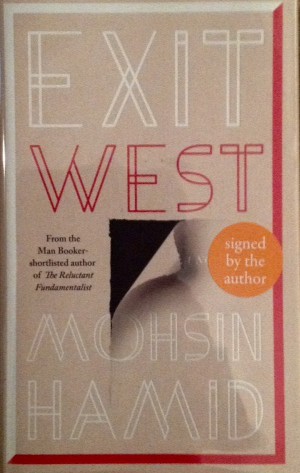Inspiring Older Readers
 posted on 24 Mar 2017
posted on 24 Mar 2017
Exit West by Mohsin Hamid
Exit West is the latest novel from Mohsin Hamid who is probably best known as the author of The Reluctant Fundamentalist. In that book Hamid explored the psychology of someone who found himself to be ‘remarkably pleased’ with the 9/11 terrorist attacks on New York. Readers and critics found themselves conflicted over whether Hamid was manipulating a sort of sympathy with the central character or condemning what was in fact a frame of mind that allowed terrorism to flourish.
In Exit West Hamid turns his attention to the issue of the refugee and those displaced by the encroachment of fundamentalist ideologies. Saeed is a rather studious young man from a ‘normal’ and sober family who becomes infatuated with Nadia, a more complex young woman who camouflages her modernity in an all-encompassing black robe that hints at conservative religiosity but is really a protection against a structurally sexist society. The two gradually come together, forging a relationship that is never wholly physically or spiritually fulfilled. As this odd romance blossoms the city (which is never identified - is it in Syria, is it in Pakistan?) a civil war starts to rage and their neighbourhood falls into the hands of a fundamentalist militia. The danger for the couple and for Saeed’s family escalates and when his mother is killed by a stray bullet the decision to get out of the city becomes an imperative.
It is at this point that Hamid introduces an element of magic realism into proceedings. A rumour starts up amongst the desperate population that certain ‘black doors’ exist through which it is possible to pass into the West – although the destination isn’t always known. Saeed and Nadia decide to risk everything on the people traffickers who guard these doors and pay an extortionate fee to be shuttled through an unguarded portal. Eventually their time comes and this is the start of their lives as migrants, firstly in Greece, then Britain and finally in the USA – passing through these magic gateways each time.
The impact of becoming ‘other’ and of being constantly in transition and labelled as a problem has its impact on the couple and all those who find themselves in motion. The bond between them changes, grows into something different and they find themselves reflecting on their own identities.
Towards the end of the novel Hamid spells out his main contention :
She always had carp in a mossy pond in the back of her house, carp that her grandfather called goldfish, and she had known the names of almost everyone on the street, and most had been there a long time…but over the years they had changed more and more rapidly, and now she knew none of them, and saw no reason to make an effort……and all sorts of strange people were around, people who looked more at home than she was, even the homeless ones who spoke no English, more at home maybe because they were younger, and when she went out it seemed to her that she too had migrated, that everyone migrates, even if we stay in the same houses our whole lives, because we can help it. We are all migrants through time.
This is, in many ways, a very simple book told in an uncomplicated way but with a sort of straightforward charm and delicacy that lures you in and keeps you held as the story unfolds. I found the opening section describing the genesis of the relationship between Saeed and Nadia in a war-torn and divided city absolutely convincing and captivating. I’m not entirely sure I could buy into the magic doorways device and the fracturing of the story and to some extent the style as we move from location to location isn’t without it cracks and strains. Having said that I enjoyed the book a lot and it’s readable at a couple of sittings – which may be the best way to tackle it.
Terry Potter
March 2017